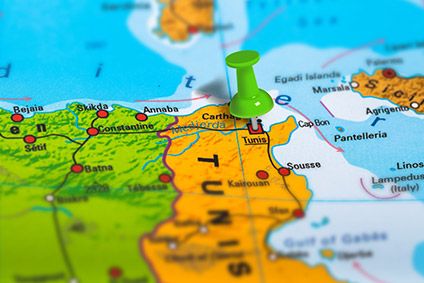
Tunisia’s textile and garment manufacturers hope that the signing of a new public/private partnership pact with the government will enable industry to meet its full potential.
Tunisian head of government, Prime Minister Youssef Chahed, last month signed an agreement with UTICA (the Tunisian Union of Industry, Business and Artisans) and FTTH (the Tunisian Textile and Garment Federation) to create a public/private partnership to push through a five-year recovery and development plan.

Discover B2B Marketing That Performs
Combine business intelligence and editorial excellence to reach engaged professionals across 36 leading media platforms.
It involves the government pledging an investment of TND100m (US$33m) to boost development and leverage further investment of TND350m (US$115m) from both the private sector and private equity funds.
Welcoming the plan, FTTH director general Néjib Karafi, told just-style: “Once we were the fourth biggest supplier [to Europe]. Our aim is to return to being in the top five producers supplying Europe.”
Karafi said his association wants to increase apparel production in Tunisia and “take advantage of our proximity to Europe; we are just 24 hours [by boat] to Marseille and [therefore] Paris.”
He added that the goal of this new investment plan is to build new factories, as well as boosting productivity in established factories, notably by improving their vertical integration. Should companies want to apply funding to achieve this, “they are very welcome.”

US Tariffs are shifting - will you react or anticipate?
Don’t let policy changes catch you off guard. Stay proactive with real-time data and expert analysis.
By GlobalDataThe agreement’s target is to increase annual exports of clothing and textile products from EUR2.18bn in 2018 to EUR4bn by 2023. The first two years are aimed at recovery from recent weaknesses in the industry, caused by economic and political instability, targeting steady annual growth in exports of around 5% to 6%, accelerating to 13% in 2021.
The ambition is to create 50,000 new jobs in the clothing and textile sector by 2023. Tunisia has a strong bank of highly trained human labour capital and high graduate and youth unemployment. According to the World Bank, Tunisia’s youth (15 to 24-years-old) unemployment was 36.27% in 2018.
Tunisia’s clothing and textile industry has certainly suffered since the international financial crisis of 2007 and the revolution of 2011 that saw the dictator President Zine Abedine Ben Ali removed from power.
Democracy came at the price of political and economic instability and, in 2016, the industry hit an all-time low, Karafi said: “We lost 400 business and 40,000 jobs.”
Textile company owners responded, setting up FTTH (La Fédération Tunisienne du Textile et de l’Habillement) as an association to generate more control of their industry’s destiny – and its officials have already seen a significant improvement in output.
Vertically integrated supply chain
The core of the latest expansion plan is to create a more vertically integrated supply chain, creating new spinning, weaving and finishing infrastructures.
“We need to be spinning our own fibres and making our own textiles,” Karafi stressed, not just to increase profit margins by avoiding import purchases but also to take control of quality. It would also speed up supply chains – important as fast fashion would be a priority for expansion.
He also noted that jeans would be another segment that the pact would aim to boost – with new backward linkages better able to make quality fabrics for quality brands such as Tommy Hilfiger, Monoprix and Lacoste that Tunisian companies have supplied in the past.
These types of brands are particularly important to Tunisia as “if you work with these brands you automatically sell across Europe, America and other territories including Africa,” said Karafi.
Speaking after the signing ceremony, Tunisian industry minister Slim Feriani noted that the plan aimed to improve strategy, governance, integration, marketing, training, infrastructure and the general business climate for the clothing and textile sector.
In another move aimed at improving international market confidence in Tunisia’s social responsibility, as well as encouraging productivity by giving workers financial stability, FTTH and National Labour Union (UGTT) recently agreed a process of salary increases over the next two years.
However, according to data from Tunisia’s Institute of National Statistics, textile, clothing and leather exports slipped 2.2% year-on-year in volume terms for the months of January and February. Overall the country’s export volumes were 3.5% lower year-on-year.





